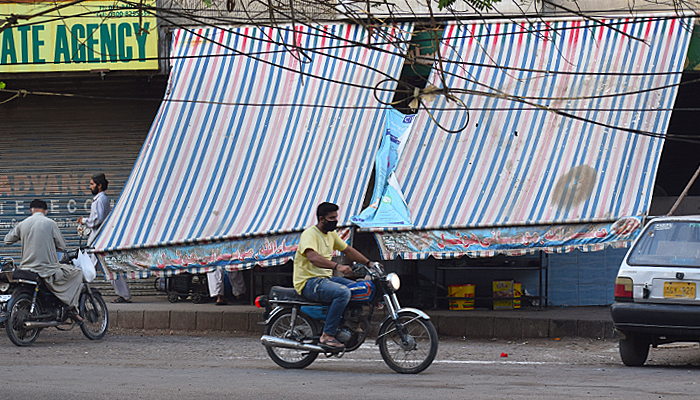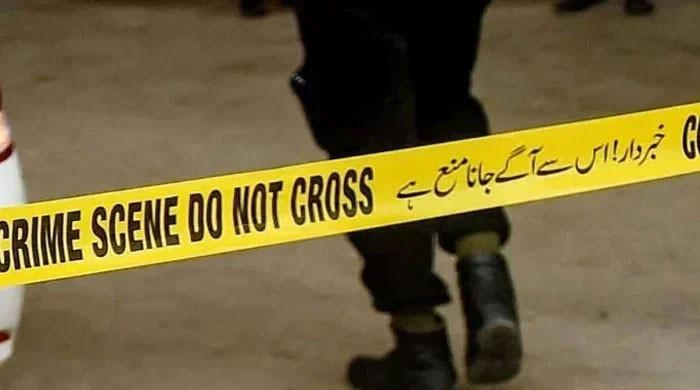Sindh accepts Karachi traders' demands, allows shops to stay open till 8pm under coronavirus curbs
Karachi's business fraternity earlier warned of sit-ins if coronavirus measures are imposed without their input
November 26, 2020

KARACHI: The government of Sindh announced Thursday evening it has accepted the demands put forth by the various traders and merchants of Pakistan's financial capital but stressed that "everyone including the shopkeeper and visitor shall wear a mask".
"This is to inform that markets in #Sindh will remain open till 8 PM," the provincial government's spokesperson, Senator Murtaza Wahab, said on Twitter.
"It is again expected from the market associations, shop owners and citizens that due regard to SOPs shall be observed & everyone including the shopkeeper and visitor shall wear a mask," Wahab added.
'Shops will remain closed once a week'
In a conversation with Geo News, Sindh information minister Nasir Hussain Shah said that shops will only close once a week (Sunday) and will remain open on Friday.
He said that the government will see to the enforcement of all directives issued by the National Command and Operations Centre (NCOC).
Shah said that all shops will remain open from 8am to 8pm.
Traders, merchants put forth demands
Earlier, Karachi's businesspeople had demanded the Sindh government allow their shops to open at 10am and conclude daily operations at 8pm after new restrictions were announced to curb the rising coronavirus cases.
The merchants' demands were announced Thursday during a joint press conference by the Karachi Electronics Dealers Association, Sindh Tajir Ittehad, and other traders' bodies of the metropolis.
Also read: Indoor dining banned in Karachi's restaurants as coronavirus cases rise
The business fraternity warned they will stage sit-ins outside the markets if the new coronavirus measures were imposed without their input.
'Have mercy on the traders'
"We have unanimously decided that shops will close at 8pm (not before)," Sindh Tajir Ittehad Chairperson Jameel Paracha said. He added that shopkeepers will not keep shops shut on Fridays, as is the new rule.
"If we are forced to do so, we will hold sit-ins outside the markets," Paracha reiterated. "Many businesses were forced to shut down during the first wave of the coronavirus [pandemic] and the torrential rains," he added.
Read more: Karachi traders reject Sindh govt's latest coronavirus measures
The Sindh Tajir Ittehad official appealed to the provincial government to "have mercy on the traders".
'Didn't get a response' from Sindh govt
On the other hand, KEDA President Muhammad Rizwan Irfan stated their markets typically neither opened at 6am nor could be. "These are no dairy farmers or meat traders," he said.
Irfan said the traders' bodies had tried to hold talks with the government of Sindh, as well as the Karachi administration, but "did not get a response".
Related: Traders reject government's proposed lockdown measures, threaten to join PDM
"We demand that business hours be fixed from 10am to 8pm," the KEDA official stated.
Earlier this week, the KEDA had rejected the provincial government's latest measures to contain the coronavirus outbreak as Sindh restricted business hours from 6am to 6pm on weekdays and ordered shops to remain closed on weekends, including Fridays.
Govt's latest restrictions draw traders' ire
Irfan, the KEDA president, had said that the business community was cooperating with the authorities but underscored that the government should fulfil its responsibility and not take away the trader's right to employment.
Similar sentiments were expressed by other bodies, including the Anjuman-e-Tajran (traders organisation) Sindh, whose senior vice-president, Jawaid Qureshi, had said the new measures would "bring more misery" to small-scale businesses.
Read more: Karachi traders say rain caused them losses worth Rs50 billion
Qureshi had asked who would visit the markets at 6am and explained that closing the shops at 6pm would lead to overcrowded markets in the evening.
Lockdown to cut incomes by 35%
"It is not appropriate to shut down the entire city," Bolton Market Association President Rafiq Jadoon had said, terming the suggested business hours as "disappointing".
The secretary-general of Karim Centre, Aslam Qureshi, had emphasised that the new lockdown measures would reduce incomes by 35% and the two weekly offs would "further damage our business activities".
Traders and the business community of Sindh had earlier, too, registered strong protests against the provincial government's decisions on coronavirus-related curbs back when the pandemic's first wave had hit.











